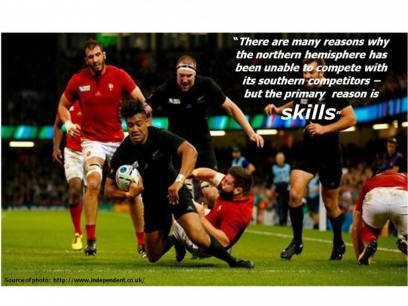Can business learn from the Rugby World Cup?
As an avid, but now somewhat embarrassed supporter of the English rugby team, I am enjoying the spectacle, the sublime rugby. The southern hemisphere seems to have wiped the floor with the northern hemisphere, and France and England in particular have looked slow, plodding and bereft of ideas. Now there is ardent debate about ‘what went wrong’ and particularly ‘how does New Zealand actually do what they do’?
Some consensus seems to be emerging: it’s about skill and skills, not brawn, not size. Not set pieces, but flair and innovation (the breakout). Everyone in the team joining in the attack (eg., prop forwards scoring tries). And finally, determination to succeed – a culture of ‘winning’ rather than just ‘playing’. The most telling comment I’ve read is this: “In New Zealand we teach skills first. Everyone must have really good basic, ball carrying and handling skills. After that, and only then, can they move to specialist positions and tasks”
Are there lessons here for business?
I am particularly thinking of parallels with marketing people in many companies, particularly in technology companies (where I often work), and where I am always struck at how knowledge of the technology is seen as being the first and key criteria to employ someone in marketing. In many companies, people move into marketing without any formal training in marketing and can end up in quite senior marketing roles without any formal marketing training or understanding.
The rugby equivalent of this is someone who gets put into a team and into a particular role without having the basics of ball handling. Over time they make mistakes, they learn the job and may even make a reasonable show of it. But they don’t know how to market. They are not instinctive. And when faced with superior competition, they are ill-equipped, and left looking like the English rugby team – brave and committed with good intent and effort, yes. But slow, plodding, clueless, bereft of a strategy or the capability to win.
In FMCG businesses (like P&G, Mars, Mondelez, etc), marketing people usually enter young and are throughly trained in the basics, so these become instinctive and natural, and only then do they get to more senior and specialist roles. Technical marketing can learn from this and New Zealand rugby. There are no shortcuts. Everyone needs to master the basics first and become completely confident, natural and even instinctive on needs analysis, segmentation, positioning etc, and share a common understanding and language of ‘how marketing works’ - and then, and only then, move into more specialist positions (Product Marketing, Marcoms, Channel, Pricing, etc).
Maybe we should be more insistent in business that our people master the basics of business, business acumen, and the skills for their ‘metier’, and only then move into more specialist and senior positions?
Posted on: Wednesday, October 21, 2015


